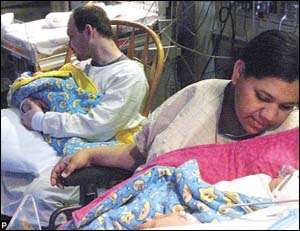
Shane and Sarah with thier twins A woman with two wombs has given birth to twin daughters - one from each uterus. Sarah Reinfelder's two babies Kaylin Joy and Valerie Marie were delivered seven weeks premature on Thursday by two Caesarean sections.
The 21-year-old from Michigan in the U.S. has a condition known as uterus didelphys, in which the womb develops in two parts, each with its own fallopian tube.
The condition affects about one in 3,000 women, although many are unaware they have it. However, the odds of carrying a baby in each at the same time are around one in five million.
Kaylin Joy, 3lb 15oz, was the first of the twins to be delivered, followed by Valerie Marie who was 4lb 15oz and born from the larger uterus.
'It's phenomenal for us to have nice healthy babies', delivering physician Dr Connie Hedmark said.
Doctors said that both girls, who have not fully developed the use of their lungs yet, would probably be kept in hospital for up to a month.
Sarah, along with her husband Shane, 23, and 10-month-old son William are thrilled with the new arrivals.
'They're so small, you're worried you're going to break them,' Shane told The Mining Journal, while holding Valerie for the first time.
'They have the tiniest feet.'
The couple had decided on two names but didn't decide which baby had which name until they were born.
'They were both darn cute, so we just went alphabetically,' Sarah said, laughing.
Although rare, there have been a number of documented cases of a woman giving birth to a child from each uterus.
In 2006 a British woman with a double uterus gave birth to healthy triplets in the first known case of its kind.
Hannah Kersey, of Northam, Devon, gave birth to a pair of identical twins from an egg that had implanted in one womb and then split, and also to a baby from a single egg in the other womb.
The likelihood of such a birth is estimated at around one in 25million.




 Minority will expose the beneficial owners of SML, recover funds paid to company...
Minority will expose the beneficial owners of SML, recover funds paid to company...
 Prof. Opoku-Agyemang has ‘decapitated’ the NPP’s strategies; don’t take them ser...
Prof. Opoku-Agyemang has ‘decapitated’ the NPP’s strategies; don’t take them ser...
 Abubakar Tahiru: Ghanaian environmental activist sets world record by hugging 1,...
Abubakar Tahiru: Ghanaian environmental activist sets world record by hugging 1,...
 Prof. Naana Opoku-Agyemang will serve you with dignity, courage, and integrity a...
Prof. Naana Opoku-Agyemang will serve you with dignity, courage, and integrity a...
 Rectify salary anomalies to reduce tension and possible strike action in public ...
Rectify salary anomalies to reduce tension and possible strike action in public ...
 Stop all projects and fix ‘dumsor’ — Professor Charles Marfo to Akufo-Addo
Stop all projects and fix ‘dumsor’ — Professor Charles Marfo to Akufo-Addo
 Blue and white painted schools will attract dirt shortly – Kofi Asare
Blue and white painted schools will attract dirt shortly – Kofi Asare
 I endorse cost-sharing for free SHS, we should prioritise to know who can pay - ...
I endorse cost-sharing for free SHS, we should prioritise to know who can pay - ...
 See the four arsonists who petrol-bombed Labone-based CMG
See the four arsonists who petrol-bombed Labone-based CMG
 Mahama coming back because Akufo-Addo has failed, he hasn't performed more than ...
Mahama coming back because Akufo-Addo has failed, he hasn't performed more than ...
